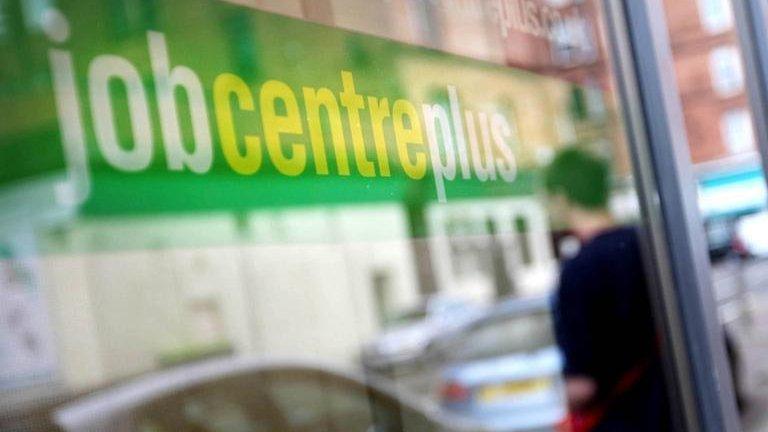Election 2015: Conservative benefit cut options leaked
- Published
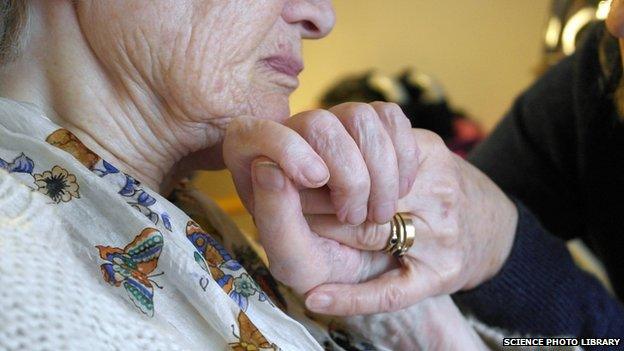
Carers' allowance is one of those thought to be under consideration
The Conservatives are considering options for scrapping several benefits, Department for Work and Pensions documents seen by the BBC suggest.
The leaked files, commissioned by Tory officials, also suggest a regional benefits cap and taxing disability benefits as ways to help cut £12bn from the welfare budget by 2017/18.
The Conservatives insisted the proposals were not party policy.
Labour's Rachel Reeves said the public had a "right to know" the plans.
The shadow work and pensions secretary has written to the Conservatives demanding they explain what welfare cuts they intend to make.
'Ill-informed speculation'
The leaked documents were prepared by civil servants at the request of Conservative Party officials.
A spokeswoman for Work and Pensions Secretary Iain Duncan Smith said: "This is ill-informed and inaccurate speculation.
"Officials spend a lot of time generating proposals - many not commissioned by politicians.
"It's wrong and misleading to suggest that any of this is part of our plan."
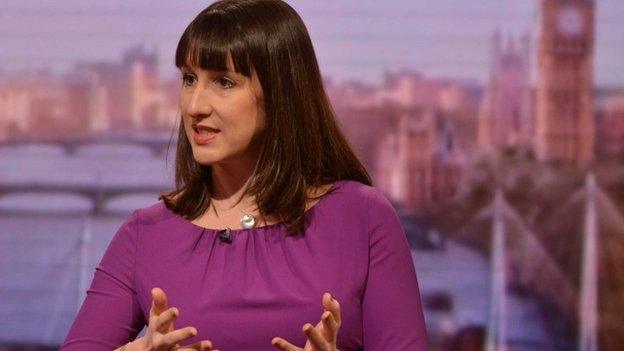
Labour's Rachel Reeves said the Conservatives had lots of questions to answer
But Ms Reeves, who has written to Mr Duncan Smith, said the public had a "right to know" what welfare cuts would be made if his party was in government after May's election.
"If those are not the benefits that you're going to cut, are you going to make further cuts to benefits to children or benefits to working families?
"With less than six weeks to go to the election, the electorate have a right to know what those £12bn of cuts are going to look like and who are going to be the people who pay the price."
'Punishing disabled people'
Liberal Democrat general election campaign spokesperson Lord Scriven said: "Conservative plans for £12bn worth of welfare cuts means £1,500 cut for eight million households.
"To build a stronger economy and a fairer society, the welfare system should be designed to help people get on in life.
"But, surprise, surprise the Tories are hell-bent on punishing disabled people and working families with crippling welfare cuts."
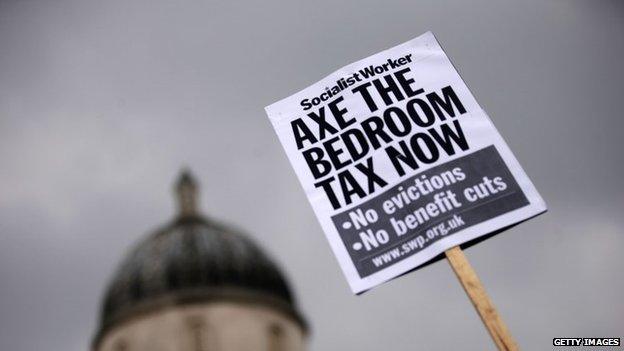
Welfare reform has been a controversial, but often popular, policy pursued by the coalition government
The BBC News investigation uncovered several benefits under consideration for change, including:
Carer's Allowance - this could be restricted to those eligible for Universal Credit. Leaked documents suggest about 40% of claimants would lose out. DWP predicted saving - £1bn
The contributory element of Employment and Support Allowance and Job Seekers Allowance - currently claimants who have paid enough National Insurance contributions can get the benefits with little means testing; DWP analysis suggests 30% of claimants, over 300,000 families, would lose about £80 per week. DWP predicted saving - £1.3bn in 2018/19
Disability benefits - Disability Living Allowance, Personal Independence Payments and Attendance Allowance (for over 65s who have personal care needs) would no longer be paid tax free. Possible saving - £1.5bn per annum (based on IFS Green Budget calculation , external)
Industrial Injuries Compensation Scheme - could be replaced by companies providing industrial injury insurance policy for employees. Any that did not would become members of a default national industrial injuries scheme, similar to the programme for asbestos sufferers. DWP predicted saving - £1bn
Council Tax Support - to be incorporated into Universal Credit. Possible saving - not known
Child Benefit - Limiting the benefit to the first two children. Possible saving IFS estimates £1bn saving per annum in the long run but little initially
Regional Benefit Caps - The £23,000 limit would vary in different parts of the country, with for instance Londoners receiving the top amount due to the higher cost of living. Possible saving - not known and dependent on where levels were set
Chancellor George Osborne refused to give details of how the Conservatives planned to save the £12bn when questioned last week following the Budget.
He has previously said the Tories would freeze the rate at which benefits are paid to people of working age, while PM David Cameron has discussed lowering the benefits cap - the maximum amount in benefits a household can receive - from the current £26,000 to £23,000.
The independent Institute for Fiscal Studies suggests those measures would save no more than about £2bn a year by 2017-18.
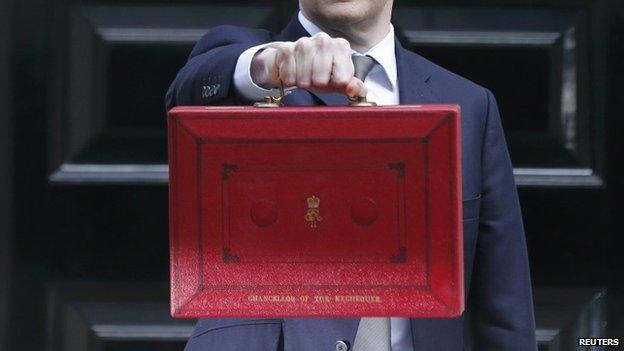
Meetings about the options have taken place recently between the chancellor and Iain Duncan Smith
'Easier cuts'
The government has cut around £20bn from projected welfare spending over the course of the past five years, through a range of measures from freezing payments rates to cutting housing benefit.
But Robert Joyce, a senior economist with the IFS, said finding another £12bn over the next two years would not be easy.
"The easier benefit cuts are the ones that will have been done first, so what's left will be harder.
"In addition, the Conservatives want to do this by 2017-18, in the next two years. It means they have to be looking at less palatable options that would involve overnight takeaways from certain families."
Richard Hawkes, chief executive of disability charity Scope, said disabled people would be "extremely concerned" that their financial support could be cut.
"Last year the Chancellor promised to exempt disability benefits from a welfare freeze. Twenty years since the Disability Discrimination Act this will be a huge step backwards."
And Rosanna Trudgian, policy officer at the charity Mencap, said the proposed changes were unfair.
"Disabled people don't choose to have their disability. They don't choose to pay for these additional costs related to that disability," she said.
- Published19 March 2015
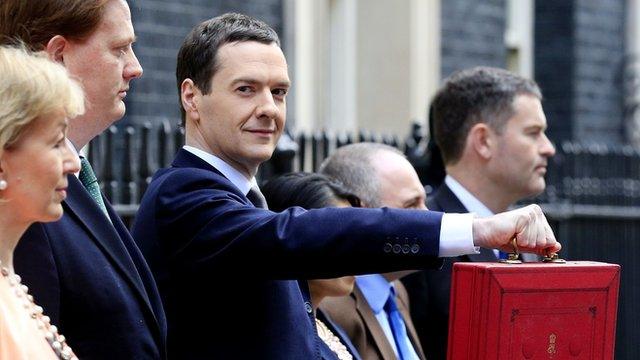
- Published29 September 2014
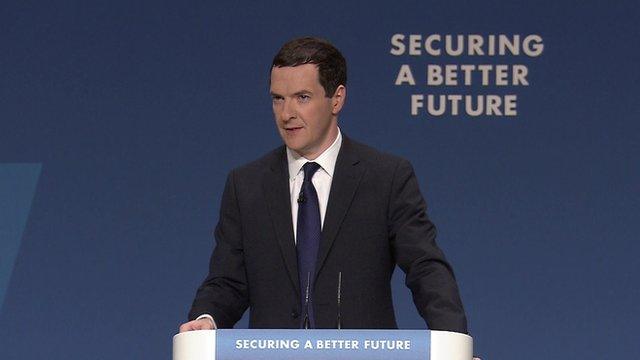
- Published15 February 2015
